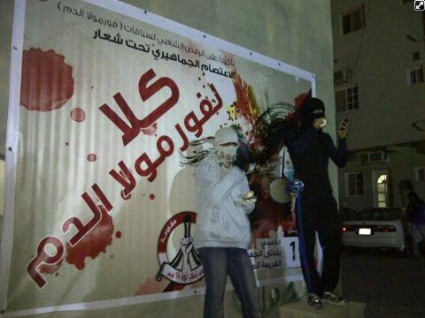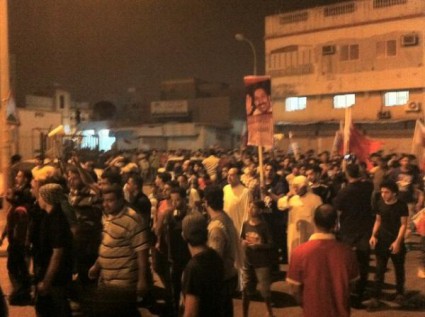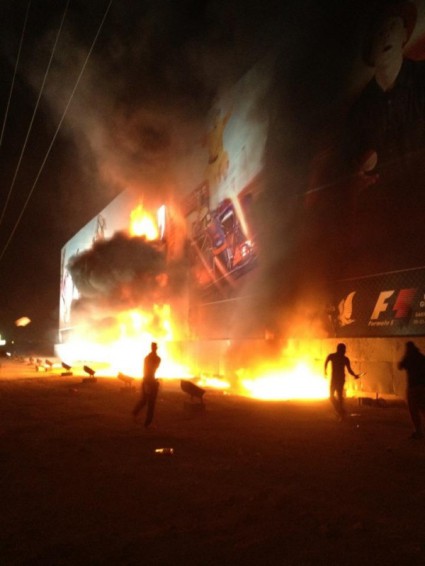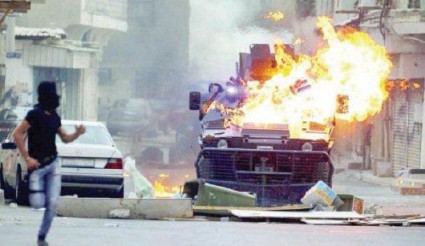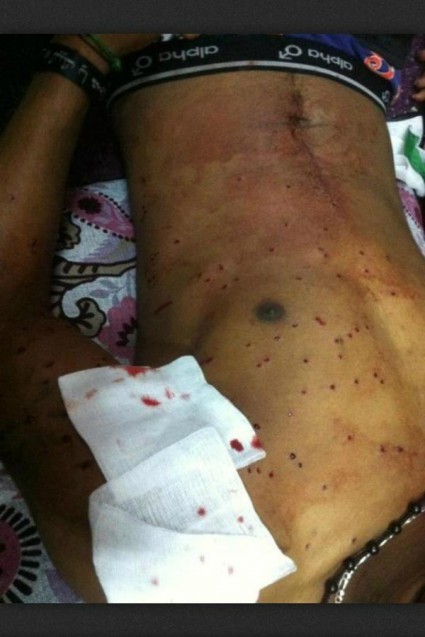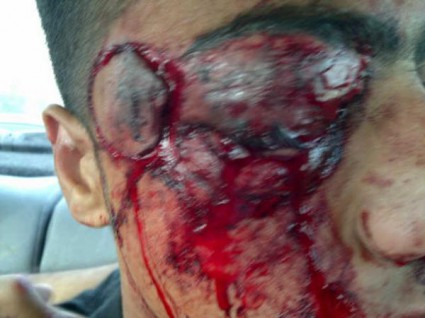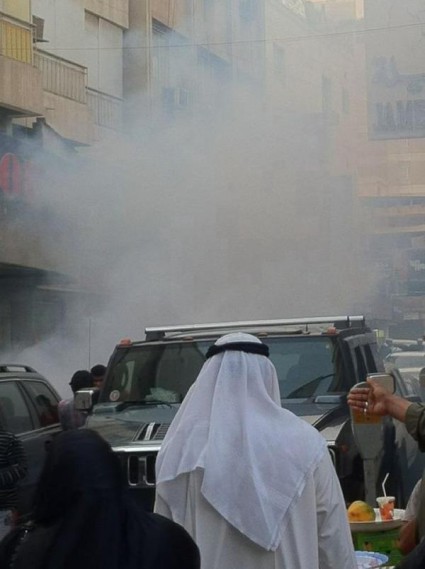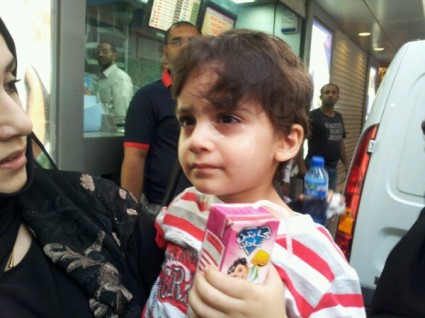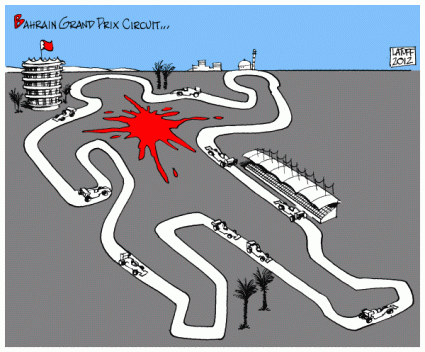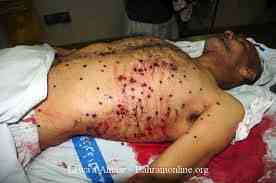Posts from — April 2012
Porsche Supercup squad MRS withdraws from Bahrain citing safety fears created by regime
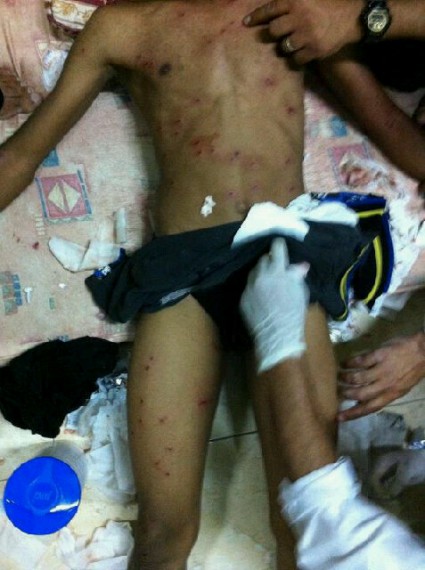
Protester being treated for injuries in home because he would be arrested at hospital, subject to torture and mistreatment
Porsche Supercup squad MRS withdraws from Bahrain citing fears about safety
By Sam Tremayne – 18 April, 2012 – autosport.com
Supercup team withdraws from Bahrain Porsche Supercup squad MRS has withdrawn its entry for the season-opener in Bahrain this weekend, citing fears about safety amid ongoing unrest in the region.
The Supercup will race in Bahrain as part of the Formula 1 undercard, although MRS has opted to forego the round – the first time in the team’s history it has cancelled a Supercup round.
“Ongoing unrests in the Kingdom of Bahrain in connection with the security situation have caused doubts by the team from Lonsee,” the team said in a statement.
Team chief Karsten Molitor said concern for the safety of his employees had forced the decision to withdraw.
“It is the first time in our team history that we have had to cancel a race of the Porsche Supercup,” Molitor said. “In the end we have the responsibility for our employees.
“The race in Bahrain is for us one of the season highlights, therefore it was not an easy to come to a decision. According to our drivers and partners we have reached the conclusion to start only at the second race in Barcelona.”
The Porsche Supercup will compete on the F1 undercard at all eight of the European grands prix in 2012 with Philipp Eng and William Langhorne. …more
April 19, 2012 No Comments
MPs try to advert disaster, call on Bahrain F1 Sponors to pull out
Britain MPs put pressure on sponsors to stop Bahrain GP
19 April, 2012 – By Tom Cary – Daily Telegraph
Formula One was coming under renewed pressure on Wednesday night from British politicians to cancel Sunday’s controversial Bahrain Grand Prix.
As anti-government protests continued in the Gulf kingdom, Labour MP Jeremy Corbyn won support for an early day motion which “believes that the Formula One race will be used by the Bahrain government as an endorsement of its policies of suppression of dissent”. At the same time as that news was filtering through to teams out here, the All-Party Parliamentary Group for Democracy in Bahrain published an open letter which it has sent to some of Formula One’s biggest sponsors, urging them to boycott this race.
“Should the Bahrain Grand Prix go ahead,” the letter read, “the sport and its associates run the risk of looking greedy and out of touch with the reality of the situation.
“We are most alarmed that you see no grounds to sever your brand and save its reputation from a totalitarian regime.”
The letter, which was signed by Andy Slaughter MP, who chairs the all-party group which includes four Lords and 17 MPs, was sent to big names from Rupert Murdoch, the chairman and chief executive of News Corporation, to Dietrich Mateschitz, the CEO of Red Bull.
Already the build-up of pressure has claimed its first victim, with Porsche Supercup squad MRS yesterday withdrawing its entry for this weekend’s race, which is part of the Formula One undercard, citing security concerns.
“It is the first time in our team history that we have had to cancel a race of the Porsche Supercup,” team principal Karsten Molitor said. “In the end we have the responsibility for our employees.”
Following the cancellation of last year’s grand prix, Formula One’s rulers confirmed last Friday their intention to push ahead with this year’s race.
The announcement triggered an increase in the number and intensity of the daily protests, which are now being witnessed by Formula One personnel, including international media, at close quarters.
Although the rowdier demonstrations are confined to outlying villages after dark, where youths and police trade tear gas and Molotov cocktails in running battles, around 100 protesters managed to gather in Bab Al Bahrain, the old souk in central Manama, yesterday afternoon, for a protest organised by human rights activist Nabeel Rajab.
Riot police used sound bombs to disperse the group after about an hour, chasing protesters through the streets, with Rajab claiming that only the presence of foreign journalists had kept them at bay that long.
“It’s positive now you are here, otherwise those guys would not respect us for a second,” he said. “We would have been attacked by sound bombs, tear gas and rubber bullets. This is the culture they have.” …more
April 19, 2012 No Comments
Bani Jamrah has dress rehersal for King Hamad’s Exodus
April 19, 2012 No Comments
Situation heats up as King Hamad’s faltering regime holds Grand Prix Hostage
Bahrain unrest intensifies ahead of Grand Prix
Lara Sukhtian (AFP) – 19 April, 2012
DUBAI — As Bahrain prepares to host this weekend’s Formula One Grand Prix, demands by protesters for democratic change are intensifying and the government position is hardening, setting the Gulf kingdom on a path to confrontation, analysts say.
Shiite-led street demonstrations have turned increasingly violent, as the ruling Sunni Khalifa dynasty continues its crackdown on dissent in a desperate effort to portray that all is well in the island kingdom ahead of Sunday’s race.
Regional allies, mainly Saudi Arabia, are lending the Khalifas a helping hand, while the United States has mostly turned a blind eye to the unrest, two key factors, analysts say, that have contributed to the current unrest.
The crisis is set against the backdrop of escalating tensions between Saudi Arabia and Iran, both of which see the success, or failure, of Bahrain’s protests as a key piece of the puzzle in regional hegemony.
There is a “pretty clear escalation,” said Joost Hiltermann of the International Crisis Group, which this week released a conflict risk alert on Bahrain.
Several factors are feeding fears of escalating unrest, he argued.
“The (political) stalemate is continuing,” and a steady pace of protests are ending in clashes, as protesters use fire bombs and security forces use tear gas and pellet guns, Hiltermann added.
According to Amnesty International, at least 60 people have been killed since the explosion of Bahrain’s Arab Spring-style uprising in February 2011.
Bahrain’s majority Shiites claim discrimination and marginalisation by the Sunni monarchy, and recent promises of reform by King Hamad have not been implemented, while attempts at a national dialogue with the opposition have amounted to nothing.
And as Formula One teams arrive in the kingdom, the opposition and the increasingly radical youth are calling for mass protests, using the world famous sporting event to shed light on their struggle.
For its part, the government is beefing up security and arresting activists, hoping to contain the unrest during the race.
Meanwhile, the deteriorating health of a prominent Shiite activist, Abdulhadi Khawaja, on hunger strike since early February, is yet another ticking time bomb.
It all makes “for a heavy brew,” said Hiltermann, warning that although the uprising is very much a local issue, it is especially dangerous because it has wider regional ramifications.
“A key factor here is the US. It doesn’t want to rock the boat because Bahrain is a critical link in its Gulf security architecture,” he said, adding that the Saudis too “are major power brokers…and have (Bahrain) by the throat economically.”
Bahrain’s crisis has unleashed long-standing fears among Sunni Gulf monarchies that a Shiite revolution in the kingdom would give Iran a foothold in the heart of the Arab Gulf. …more
April 19, 2012 No Comments
Death of the fear tyranny is the meme of revolution
Protests planned near Bahrain circuit
(UKPA) – 19 April, 2012
Pro-democracy protesters are scheduled to launch demonstrations in the vicinity of the Bahrain International Circuit on Sunday.
It is confirmation for the first time the threat of trouble has been mentioned with regard to the race, given previous rallies have been confined to villages and townships.
A risk assessment group, however, are suggesting the dangers that could lie ahead, both at the circuit and also Bahrain University, which lies two kilometres away. It then becomes a question of what level of protest unfolds, in particular as security will be at its tightest on race day.
Over the last few days demonstrations have increased in number, with 15 alone taking place in a number of areas across the Gulf island.
That followed a city centre protest spearheaded by the leader of the Bahrain Centre of Human Rights, Nabeel Rajab, which finally dispersed once riot police released sound bombs.
Protests are due to be ramped up over the next few days as the dissidents voice their objections to the government and Formula One.
In particular, one group known as the Coalition of the Youth of the Feb 14 Revolution have vowed ‘three days of rage’ over the course of this weekend.
One senior figure of main opposition party al-Wefaq, Sayed Hadi al-Mousawi, has asserted there will be demonstrations in the Sakhir region.
“There are hundreds, or maybe thousands, who will get there and raise slogans,” said al-Mousawi.
“They don’t care if they are taken to jail. People have reached the point of no fear.” …source
April 19, 2012 No Comments
Grand Prix spins-out as Bahrain Corporate hospitality plans crashed by Regime violence against protests
Companies shun Bahrain Grand Prix hospitality
By Tom Bergin and Keith Weir – 19 April, 2012 – Reuters
(Reuters) – Western companies are opting not to entertain clients and partners at the Bahrain Grand Prix following calls for sponsors to boycott the event because of political turmoil.
Royal Dutch Shell, which sponsors the Ferrari racing team, will not be hosting any guests at the event, a source familiar with the company’s plans said.
The Grand Prix was not held last year when an anti-government movement erupted in Bahrain following after uprisings in Egypt and Tunisia, but in 2010 and other years, Shell had invited a “small number” of guests, the source added.
Shell declined comment on its hospitality plans but a spokesman said technicians would be there to support the Ferrari team “if the race goes ahead”.
Safety fears grew on Thursday after members of the Force India team were caught up in a petrol bomb incident and police used teargas to disperse protesters.
Agencies which offer corporate hospitality were also seeing less business than they had in previous years.
“We’re 80 percent down. We’ve got so few people going we’ve not even bothered to send out a representative to host them,” Daniel Bois, director of London-based ticket agency F1 Corporate said.
He added that the risk of violence was one of the reasons potential clients appeared to be deterred.
A source close to the matter said that Swiss bank UBS would not be sponsoring any client events at the Bahrain race.
Corporate hospitality raises around $200 million in total during the 20-race season – about 10 percent of total revenues for Formula One, a business majority owned by private equity firm CVC Capital Partners.
Vodafone, which sponsors the Maclaren racing team, said it was not planning to invite guests to the Grand Prix, scheduled for April 20-22, adding it was not a race at which it had historically arranged significant entertainment as it does have an operating business in Bahrain.
In recent days, a group of British lawmakers sent a letter to Formula One sponsors warning them they risk damaging their brands by supporting the race.
“We are aware of the international concerns. We continue to monitor the situation very closely. However, whether or not the event should proceed is a matter for the teams and Formula One,” said a Vodafone spokesman.
The International Automobile Federation (FIA) gave the green light last week that the event, cancelled last year amid a violent crackdown on pro-democracy demonstrators, was on. …source
April 19, 2012 No Comments
Cyprus, UK, and Italian Birdshot, other Live Ammunition being used against Bahrain F1 Protesters
A DANGEROUS ESCALATION: AT LEAST 11 SHOTGUN INJURIES ON 18 APRIL 2012
19 April, 2012 – Jadaliyya
Bahrain Watch Identifies Cyprus, UK, and Italian Birdshot, and Other Live Ammunition
[Manama] Activist group Bahrain Watch has observed a dramatic escalation in the use of birdshot and live ammunition by police against protesters over the past week, as well as a marked increase in related injuries. Many individuals are reported injured in the back, raising serious questions about whether police are using proportional force and are discharging their firearms only as a last resort, as required by Bahrain’s new police code of conduct. Meanwhile, new video shows policemen laughing as they repeatedly beat an arrestee with their shotguns, the result of continuing impunity.
Bahrain Watch has identified six birdshot manufacturers, and four manufacturers of live ammunition whose products have been used in Bahrain. The widespread use of these types of ammunition to control protests and riots makes Bahrain an international pariah in policing.
What is Birdshot?
Broadly, ammunition for shotguns is referred to as “shot,” and consists of pellets of a certain material inside a cartridge. Larger pellets are referred to as “buckshot,” whereas smaller pellets are called “birdshot.” Within the category of birdshot, shot is assigned a number to indicate the diameter of the pellets. Bahrain Watch has observed two sizes of metallic birdshot in Bahrain: #2 birdshot (pellet diameter of about 3.8mm), and #8 birdshot (pellet diameter of about 2.2mm). Typically, a #2 birdshot cartridge would have on the order of 100 pellets, whereas a #8 birdshot cartridge would have on the order of 500 pellets, assuming pellets are made of lead or a similar metal. Bahrain’s Ministry of Interior denies that it uses #2 birdshot.
Birdshot is typically used for hunting animals, or for clay shooting, where competitors shoot to break flying stone discs. Metallic birdshot is almost never used for riot control. When shotguns are employed for riot control in other countries, officers typically shoot “less-lethal” ammunition such as “beanbag rounds.” In contrast, Bahrain’s police primarily use cartridges specifically designed and marketed for hunting or clay shooting. Eleven civilians were killed with birdshot in Bahrain during 2011 according to the Bahrain Independent Commission of Inquiry and Human Rights Watch, and scores have been injured throughout 2011 and 2012.
April 18, 2012: Bahrain’s Birdshot Night
While Bahrain Watch has observed near-continuous use of birdshot since the start of the uprising in February 2011, reports of birdshot use and injuries have dramatically spiked in the last week. On 12 and 13 April 2012, Bahrain Watch noted an abnormally large number of images of shotgun cartridges posted by activists from at least seven areas around Bahrain (A’ali, Bani Jamrah, Sehla, Ma’ameer, Sitra, and Duraz). On 13 April, an individual was seriously injured by birdshot at a funeral, and remains in the hospital.
On 18 April 2012, Bahrain Watch noted an unusually large number of images and videos of birdshot injuries from at least five areas around Bahrain. Reports on Twitter claimed up to 23 were injured by shotgun pellets on the night of 18 April. No medical records exist, as birdshot victims are treated in private homes; presenting at a hospital with a birdshot injury may mean arrest. Through pictures posted by village news networks and activists, Bahrain Watch has seen at least 11 of these injured individuals.
Bahrain Watch first performs reverse image searches on all posted images to validate their recency To identify distinct injuries, images from a given village are compared with each other.
Bahrain Watch stresses that the number of injuries is likely to be higher than 11, but cannot determine the number of additional distinct individuals injured. A description of the observed injuries from 18 April follows.
In Sanabis, where protesters chanted anti-regime slogans during a visit by Bahrain’s Crown Prince earlier that day, multiple injuries were reported in the evening. A village news agency in Sanabis posted a photo album of injuries. Among other birdshot injuries, the album shows:
An individual with more than 100 pellets in the back of his legs (right leg) (left leg).
An individual with more than 45 pellets in his back, also seen in this video (0:24 – 0:34).
An individual with more than 20 pellets in the back of his legs (right leg) (left leg), also seen in this video (0:05 – 0:21).
An individual with approximately 14 pellets in the left side of his body.
In the village of Abu Quwah, photos show:
An individual with more than 80 pellets in what appears to be his back.
An individual with more than 30 pellets in his back.
On the island of Sitra, photos and videos show:
An individual with more than 30 pellets mainly on the right side of his body. 16 pellets are visible in this still image, and the remaining pellets are seen in this video (0:05 – 0:29).
An individual with approximately 18 pellets mainly on the right side of his body, also seen in this.
…source
April 19, 2012 No Comments
The good people of Bahrain prepare for the 2012 Grand Prix Race of Shame
April 19, 2012 No Comments
Bahrain F1 head bashing reminecent of Chief Timoney’s RNC, Miami bash
April 19, 2012 No Comments
Bahrain Revolutionaries hand out cocktails in Manama Streets following Chemical Gas attacks
April 19, 2012 No Comments
Bahrain Youth Revolutionary Ready with Cocktail in Hand after being attacked by Chemical Gas
April 19, 2012 No Comments
Can’t Stand the Heat, get out of the Pits – F1 Goes Home
Motor racing-F1 staff leave Bahrain after petrol bomb incident
19 April, 2012 – By Alan Baldwin – Reuters
MANAMA, April 19 (Reuters) – The violent reality of Bahrain’s political unrest moved closer to Formula One on Thursday when the Force India team said two of their staff had asked to go home after colleagues were caught up in a petrol bomb incident outside Manama.
A spokesman for the British-based team said one of those concerned was a team member, the other a contractor brought in for Sunday’s race. Neither were directly involved in the incident on Wednesday evening.
He said four team members had been returning in their rental vehicle to their Manama hotel from the Sakhir circuit when they were caught up in the incident on the motorway.
The Bahrain International Circuit issued a statement referring to “an isolated incident involving a handful of illegal protester acting violently towards police.
“During this incident a Molotov Cocktail landed in the vicinity of their vehicle. After approximately two minutes, the route was cleared and the vehicle carried on its journey,” it added.
“There were no casualties and eyewitness reports from the scene confirmed that their vehicle had not been targeted itself.”
The circuit said it had confidence in the authorities to deal with such incidents “and can confirm that all the usual precautions are being taken around the track to ensure the level of security is maintained”.
Numerous anti-government protests took place in and around Manama on Wednesday evening, with more planned leading up to the race, including one near the circuit according to the U.S. embassy. Police fired sound bombs to disperse the crowd.
Force India, whose drivers are Germany’s Nico Hulkenberg and Britain’s Paul Di Resta, said they had not been a target and nobody was hurt.
The MRS team entered in the supporting Porsche SuperCup series withdrew its entry from the weekend season-opener, citing safety reasons, without travelling to Bahrain.
“It is the first time in our team history that we have had to cancel a race of the Porsche SuperCup,” team head Karsten Molitor told autosport.com. “In the end we have the responsibility for our employees.”
Anti-government protesters are planning ‘Days of Rage’ ahead of a race that they want called off while security forces have rounded up dozens of activists in recent days in a clampdown on the opposition.
NO GUARANTEES
Bahrain has been in turmoil, with almost daily protests, since a democracy movement erupted last year after popular uprisings in Egypt and Tunisia.
Local authorities have said teams need not worry about their personal safety but John Yates, the former assistant commissioner of London’s Metropolitan police who has been hired to oversee reform of Bahrain’s police force, said there could be no guarantees.
“People say can we guarantee security. Of course we can’t guarantee security. I’d be a fool to sit here and say that,” he told the Guardian newspaper.
“I judge it more likely there will be protests on the route and around the villages. I just hope it’s a good event and I hope it goes off without too much trouble.”
Police maintained a low-key presence around the circuit on Thursday, although that was likely to be stepped up considerably closer to the event and in the evening when teams are returning to Manama.
Teams at the circuit were holding news conferences as usual, without any reference to the political situation and tension around them. Nothing in their race previews indicated the event was anything other than a normal round of the 20-race championship.
Formula One last visited Bahrain in 2010, with last year’s race cancelled due to the protests, and the race is the biggest sporting event on the tiny Gulf island, with a global television audience of tens of millions.
April 19, 2012 No Comments
F1 Bahrain ‘Days Of Rage’: “protest activities planned at the track”
Bahrain ‘Day Of Rage’ Planned For Formula One Grand Prix
18 April, 2012 – By Andrew Hammond – Huffington Post
DUBAI, April 18 (Reuters) – Anti-government protesters in Bahrain are planning “days of rage” directed at this weekend’s Formula One Grand Prix, while security forces have rounded up dozens of activists in a clampdown on the opposition in the Gulf Arab nation.
Bahrain has been in turmoil since a democracy movement erupted last year after uprisings in Egypt and Tunisia.
The island state’s revolution was initially crushed with the loss of dozens of lives but youths still clash daily with riot police and thousands are turning out for opposition rallies as the motor race approaches.
“Boycott F1 in Bahrain,” reads a graffiti message daubed on a wall in a village outside the capital, Manama, next to a painted image of a red Ferrari race car. “You will race on the blood of martyrs.”
Bahrain’s ruling Al Khalifa family had to cancel last year’s race because of the uprising, but its return on April 20-22 is a chance to tell the world that all is back to normal – which could work if protests and clashes are kept to Shi’ite districts and do not reach major highways or the capital.
Bernie Ecclestone, the colourful British owner of the commercial rights to Formula One, said last week the race would go ahead because all was “quiet and peaceful” in Bahrain, which paid last year’s hosting fee of an estimated $40 million despite cancelling the race due to the conflict.
The Bahrain race, part of a 20-event worldwide season that has revenues of $2 billion, drew 100,000 visitors and generated an estimated half a billion dollars in spending when it was last held two years ago. Formula One, the business arm of one of the world’s most watched sports, is expected to be floated on the Singapore stock exchange later this year.
Race organisers say “the security situation in Bahrain is suitable for the staging of a major sporting event”. John Yates, a former senior British police officer hired by Bahrain to oversee reform of its police force, said he felt “safer than I have often felt in London”.
The official Formula One website, describing the Sakhir Circuit as “first-rate”, tells visitors: “As the wind picks up each evening and the early sunset takes hold, the place has a magical ‘Arabian Nights’ feel to it.”
Amnesty International said in a report this week that dozens remained in jail after unfair military trials for their role in mass protests a year ago while action was needed to address what the human rights group called discrimination against majority Shi’ites.
“With the world’s eyes on Bahrain as it prepares to host the Grand Prix, no one should be under any illusions that the country’s human rights crisis is over,” said Hassiba Hadj Sahraoui, Amnesty’s Middle East and North Africa Deputy Director.
OPPOSITION PARTY RALLIES
The opposition, led by the Wefaq party, say they do not oppose the race and their protests – licensed by a government under U.S. pressure to allow more space for dissent – will focus on demands for political reforms in a country where the Khalifa family dominates government and the economy.
Formula One was originally brought to Bahrain in 2004 as part of economic reforms championed by Crown Prince Salman – whom Wefaq continues to bet on as a man to deliver political reform – to encourage foreign investment and jobs for Bahrainis.
“We think Formula One is a secondary issue compared to the question of long-term rights. What we care about is our demands. We don’t want to ruin the projects’ of others,” said senior Wefaq member Sayed Hadi al-Mousawi.
But he predicted protesters would try to hold demonstrations near or inside Sakhir, which lies south of the capital and away from most residential areas.
“There are hundreds or maybe thousands who will get there and raise slogans, and they don’t care if they are taken to jail. People have reached the point of no fear,” Mousawi said.
Thirty-five people died during a month of protests when the uprising first began last year, but activists say the ongoing violence has taken the toll to around 70.
Activists say heavy use of tear gas has caused many deaths. The government disputes the causes of death and their attribution to the strife, and accuses youths of endangering police lives with petrol bombs.
YOUTH PROTEST MOVEMENT
Opposition figures outside the political parties and who are opposed to the race say they will stage protests inside the F1 circuit if they can, hoping to catch international attention.
They say they will host daily events, including a march in Manama on Thursday at a location to be announced, culminating in a country-wide “day of rage” on both Saturday and Sunday.
“They plan activities at the track but they have not announced what. For sure there will be something,” said Sayed Yousif al-Muhafda of the Bahrain Centre for Human Rights.
Activists opposed to the race point out that some Bahrain International Circuit employees say they suffered torture during the period of martial law that ended last June. Bahrain commissioned a report by international rights experts which revealed systematic abuse during the crackdown. …more
April 18, 2012 No Comments
F1 to be met with Days of Rage
Bahrain activists vow days of rage for F1 race
19 April, 2012 – The Dailiy Star
DUBAI/MANAMA: Anti-government protesters in Bahrain are planning “days of rage” directed at this weekend’s Formula One Grand Prix, while security forces have rounded up dozens of activists in a clampdown on the opposition in the Gulf Arab nation.
Bahrain has been in turmoil since a democracy movement erupted last year after uprisings in Egypt and Tunisia.
The island state’s revolution was initially crushed with the loss of dozens of lives, but youths still clash daily with riot police and thousands are turning out for opposition rallies as the motor race approaches.
“Boycott F1 in Bahrain,” reads a graffiti message daubed on a wall in a village outside the capital, Manama, next to a painted image of a red Ferrari race car. Another message reads: “You will race on the blood of martyrs.”
Bahrain’s ruling Al-Khalifa family had to cancel last year’s race because of the uprising, but its return on April 20-22 is a chance to tell the world that all is back to normal – which could work if protests and clashes are kept to Shiite districts and do not reach major highways or the capital.
Bernie Ecclestone, the colorful British owner of the commercial rights to Formula One, said last week the race would go ahead because all was “quiet and peaceful” in Bahrain, which paid last year’s hosting fee of an estimated $40 million despite cancelling the race due to the conflict. …more
April 18, 2012 No Comments
Hunger strikes and political prisoners in Bahrain and the West Bank
Hunger strikes and political prisoners in Bahrain and the West Bank
by Claire Schaeffer-Duffy – 18 April, 2012 – National Catholic Reporter
Bahraini human rights activist Abdulhadi al-Khawaja is beginning the 10th week of a hunger strike at a military prison hospital in Bahrain. Family members and his lawyer fear he could be close to death.
Al-Khawaja, 52, was arrested and tortured last spring amid a government crackdown against a popular uprising calling for reform of Bahrain’s Sunni-led monarchy. In June, a military court convicted him of “organizing and managing a terrorist organization” and sentenced him to life imprisonment. He launched his hunger strike — the fourth since his detention — to demand his release and the release of all Bahraini political prisoners of conscience.
Al-Khawaja is a highly regarded human rights leader, and news of his deteriorating health has intensified the international campaign for his release. From 2002 to 2008, he co-founded and served as the first president of the Bahrain Center for Human Rights, and most recently worked as the Middle East and North Africa project’s coordinator for Front Line Defenders. The Irish-based human rights organization has created a video to publicize his case:
Last week, Danish Prime Minister Helle Thorning-Schmidt urged Bahrain to release the jailed activist, who has dual citizenship, saying he was in “very critical” condition. The prime minister’s appeal came after a judicial panel refused Denmark’s request for custody.
On Monday, two protesters draped a banner from the roof of the Bahraini Embassy in London that bore an image of al-Khawaja and imprisoned Bahraini Shi’ite opposition leader Hussan Mushaima. “Over 60 days on hunger strike,” the banner read in reference to al-Khawaja. Amnesty International just issued an action alert and petition on his behalf and Wednesday, Germany’s top human rights official, Markus Loening, called on Bahrain to release al-Khawaja and the “few hundred protestors” still imprisoned more than a year after the Arab Spring demonstrations.
All this publicity comes days before Bahrain is scheduled to host the Grand Prix. The royal family is reportedly divided on whether to release the jailed human rights activist. They publicly insist his situation is not grave because he is receiving fluid through IVs, but photos of the emaciated al-Khawaja widely circulated online don’t support that description. …more
April 18, 2012 No Comments
Victim of King Hamad’s F1 Opening Ceremonies – dozens more just like him – Welcome F1
April 18, 2012 No Comments
Letter of Solidarity from Palestinian Prisoners to the People of Bahrain
Letter of Solidarity from Palestinian Prisoners to the People of Bahrain
by sasha- 18 April, 2012 – Witness Bahrain
Rough English translation below. The original Arabic is published here: http://www.almasryalyoum.com/node/777866
Your freedom is our freedom and our freedom is your freedom!
Greetings to you, my brother, Abdul-Hadi al-Khawaja, struggling in the face of tyranny and for freedom, freedom of the individual, the people and the nation, whether in Bahrain or in any/every corner of the Arab world.
In past years I have stood in solidarity with you from Haifa, from the captive nation of Palestine, which surrounds the racist, colonial, Zionist project; and today I am in solidarity with you while in an Israeli jail, two years out of an unjust nine-year sentence — a high price imposed by the colonial system on Palestinian leaders of 48 to deter them from communication with the Arab people throughout the Arab world, and the price of our interaction with people’s movements and struggles for their freedom and the freedom of Palestine and its people.
I follow your case from an Israeli jail in the north of 1948 occupied Palestine. I feel strong, the greatness of your stance, your gloriousness, and your heroic struggle, echo to dock with the stands of the heroic Palestinian militants Hana Al-Shalabi and Khader Adnan, who led open ended hunger strikes that lasted two months, and will also meet with the stance of five thousand Palestinian and Arab prisoners still in Israeli prisons.
When the will is free and the cause is just, and you embody both, the human is capable of making miracles happen, and no oppressive, tyrannical, murderous regime can harm it, not the Bahraini regime, subject to U.S. colonial imperialism, or the Israeli colonialism system in Palestine. It is the system of colonialism and its puppet regimes that have lost all legitimacy; while the people are legitimacy and its source.
Said the Palestinian poet Mahmoud Abdul-Rahim:
I will carry my soul in my hand
And throw it in the valleys of death
It is either a life that makes a friend happy
Or a death that makes an enemy angry
As you «carry your soul» in your open hunger strike, behind this is the essence of your position — that you love life; only he who loves life has the courage and the will to sacrifice for freedom and human dignity and the dignity of his people and the country’s freedom.
Greetings to you and be confident that the prisoners of Palestine are with you and the people of Bahrain and its revolution.
Prisoners of freedom and supporters of freedom in the world are with you.
Ameer Makhoul / Haifa – Palestine
(From the fleeting Israeli prison of Gilboa prison no matter how long the captivity) …source
April 18, 2012 No Comments
Idiocy – John Yates: lures F1 teams to Bahrain saying “all is safe”, once arrived says “can’t guarantee safety”
12 April, Yates wrote: “Along with my family, I feel completely safe. Indeed, safer than I have often felt in London.”
Security can’t be guaranteed at Grand Prix, says Yates of the Yard
Richard Hall – 19 April, 2012 – The Independent
The former high-ranking Metropolitan Police officer currently advising the Bahraini government has said that security cannot be guaranteed at the upcoming Grand Prix.
Former Assistant Commissioner John Yates made the remarks as anti-government demonstrations continued to rock Bahrain and protesters called for a “day of rage” ahead of the event this weekend. Nearly 50 people have been killed since February 2011 in violence between security forces and protesters from Bahrain’s Shiite majority, which seeks to break the near monopoly on power by the island nation’s Sunni monarchy.
Protests have intensified in recent weeks and opposition activists have called for the F1 race to be cancelled.
Mr Yates, who in his previous job was known as “Yates of the Yard”, is currently on a six-month contract advising Bahrain’s ruling Khalifa family on police reform. He is also working on security for the event. He told the Guardian: “People say can we guarantee security. Of course we can’t guarantee security. I’d be a fool to sit here and say that. Is it possible there might be an incursion on the track? Of course there is. It’s an open event. Can you stop some idiot running onto the track? There have been other incidents of track incursions.”
Opposition figures outside the political parties – and who are opposed to the race – say they will stage protests inside the F1 circuit if they can, hoping to catch international attention.
Mr Yates said of the planned demonstrations: “There will be protests over the weekend. But we want to make this a sporting event, not a security event. …more
April 18, 2012 No Comments
F1 Companies don’t respond to Human Rights Concerns: “Seldom have we seen a response rate this low anywhere”
Bahrain Grand Prix: Only 29% of Formula One Companies Respond To Human Rights Concerns
How Formula One companies responded (or failed to respond) to human rights concerns
18 April, 2012 – Business & Human Rights Resource Centre
LONDON, Apr. 18 – CSRwire – Only 29% of firms linked to Formula One responded to Business & Human Rights Resource Centre about human rights concerns that various organizations raised relating to the Bahrain Grand Prix, scheduled for 20-22 April. Forty two companies or teams failed to respond.
See all the responses on this webpage, which also lists each company that failed to respond. That page also summarises human rights concerns raised by international human rights groups, human rights advocates in Bahrain, and others. Human Rights Watch warned Formula One that by holding the Bahrain Grand Prix, it would be endorsing the kingdom’s government despite claims that sport and politics don’t mix. Amnesty International said “Human rights violations are continuing unabated… Holding the Grand Prix in Bahrain in 2012 risks being interpreted by the government of Bahrain as symbolizing a return to business as usual.” The UK Labour Party urged Formula One to cancel the Bahrain Grand Prix, saying that proceeding with the event would “send the wrong signal.” Among the prisoners of conscience detained in Bahrain is human rights advocate Abdulhadi al-Khawaja, who is on hunger strike – there are fears that he may soon die.
The company responses were on the whole disappointing, given the gravity of the human rights concerns raised about Bahrain, and given that last year the United Nations Human Rights Council adopted by consensus the Guiding Principles on Business and Human Rights, which confirmed that all companies have a responsibility to respect human rights.
“Seldom have we seen a response rate this low from a group of companies anywhere in the world”, said Christopher Avery, Director of Business & Human Rights Resource Centre. “And of the responses that were received, seldom if ever have we seen such a high proportion that completely fail to comment on the human rights concerns that they were asked to address.”
Chris Marsden, Chair of the board of Business & Human Rights Resource Centre, said: “I encourage everyone to look at each company’s response and to draw their own conclusions about which companies are taking human rights concerns seriously, and which are not.”
April 18, 2012 No Comments
MOI Police Attack Peaceful Protest in Manama
On Wednesday, opposition supporters held a protest demanding Sunday’s Grand Prix also be called off, and calling for the immediate release of Mr Khawaja in Old Manama. A Bahraini journalist, who asked not to be named for fear of arrest, told the BBC that there were chaotic scenes outside Bab al-Bahrain, which marks the entrance to the main souq. The journalist warned: “If he dies the streets will explode.”
Clashes erupt after Bahrain Grand Prix exhibit protest
BBC – 18 April, 2012
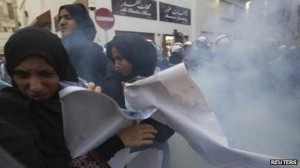
Women protesters run after a stun grenade is fired at them in Old Manama (18 April 201″) Anti-government protests have been widespread in the run up to the Grand Prix
Bahraini security forces have fired stun grenades at protesters outside a cultural exhibition in Manama ahead of Sunday’s Formula 1 Grand Prix.
A local journalist told the BBC the demonstrators in Old Manama were shouting “Down, down, F1” and demanding the release of Abdulhadi al-Khawaja.
The activist has been on hunger strike in prison for more than two months.
Mr Khawaja’s lawyer earlier told the BBC that his client had removed the intravenous drip keeping him alive.
The 52-year-old told his wife on Tuesday afternoon that he was also now refusing anything but water, Mohammed al-Jishi said.
Mr Khawaja believed nothing was being done to resolve his continued detention, and this was the only way to force the issue, he added.
Abdulhadi al-Khawaja in hospital (3 April 2012) Abdulhadi al-Khawaja’s lawyer released this picture of his client taken in hospital on 3 April
Mr Khawaja was convicted by a military court in June of plotting against the state, but human rights groups have said that his trial was “grossly unfair”.
They said his conviction was based on a confession he made under duress, and that no evidence was presented showing he had used or advocated violence during protests against King Hamad Al Khalifa.
Bahrain’s highest court is due to rule on Mr Khawaja’s appeal against his conviction on Monday – a day after the Grand Prix.
Last year’s race was cancelled after at least 35 people, including five police, were killed during a crackdown on pro-democracy protests.
Activists ‘arrested’
Formula 1’s governing body, the FIA, only decided to go ahead with this weekend’s race at the last minute.
Continue reading the main story
At the scene
image of Rupert Wingfield-Hayes Rupert Wingfield-Hayes BBC News, Manama
Although the number of activists was small, they managed to get right in to the centre of Manama’s old market, an area frequented by tourists and expatriates. Once there, they held up banners demanding the release of Abdulhadi al-Khawaja, who is in prison on the 70th day of a hunger strike, and reportedly close to death.
The protesters are determined to use this weekend’s Formula 1 race to draw world attention to their year-long campaign for democracy, and to the government’s continuing suppression.
The government, run by the ruling Al Khalifa family, is determined to stop them. Opposition groups say between 60 and 80 activists have been taken from their homes in the last few days as the government rounds up those it fears will cause most trouble.
On Wednesday, opposition supporters held a protest demanding Sunday’s Grand Prix also be called off, and calling for the immediate release of Mr Khawaja in Old Manama.
A Bahraini journalist, who asked not to be named for fear of arrest, told the BBC that there were chaotic scenes outside Bab al-Bahrain, which marks the entrance to the main souq.
Veteran activist Nabeel Rajab reportedly stood near Bab al-Bahrain chanting anti-government slogans, while others carried signs reading: “Your silence is killing al-Khawaja”.
The journalist warned: “If he dies the streets will explode.”
Riot police at first demanded the protesters leave. When they refused, officers fired deafening “sound bombs” into the crowd, sending protesters and bystanders running.
Stun grenades and rubber bullets were also used to disperse the protesters, while helicopters circled overhead and interior ministry officers filmed the clashes, the journalist said.
The Bahrain Youth Society for Human Rights meanwhile told AFP news agency the authorities had arrested about 80 pro-democracy activists from villages outside the capital ahead of the Grand Prix.…more
April 18, 2012 No Comments
Solitary Confinement for 14,600 Days. No human being deserves this
14,600 Days in Solitary Confinement
Bryna Subherwal – 16 April, 2012 – Amnesty International USA
No human being deserves this.
23 hours a day isolated in a small cell, four steps long, three steps across. Three times a week for exercise in an outdoor cage, weather permitting. A few hours every week to shower or simply walk. Rare, fleeting human contact with prison guards, let alone with family.
This describes four decades of existence for Albert Woodfox and Herman Wallace in Louisiana, two members of the so-called “Angola 3″ who pass their remaining hours “in the hole” to this day.
April 17th will mark 40 years — 14,600 days — of their nightmare. The conditions in which these two men are held, as well as the tragically absurd duration of this punishment, violate a host of human rights treaties to which the US is a party, including those covering basic standards for treatment of prisoners. Prisons simply shouldn’t operate this way in the US.
Woodfox and Wallace may be in isolation, but they are not forgotten. Our calls for justice will ring loud — on April 17 we’ll make sure Louisiana Governor Bobby Jindal hears us when we arrive at his Baton Rouge doorstep with tens of thousands of petition signatures from people in 125 countries in hand.
We can’t let more days pass without justice. Herman Wallace is now 70 years old, Albert Woodfox is in his mid-60s, and both men are suffering from serious health problems — made worse by the appalling deprivation in which they live.
Ill, advancing in age, with clean disciplinary records for the last 20 years — what is so dangerous about these men that could possibly warrant this inhumane treatment, for so long?
Because the prison authorities see them as a threat. The “Angola 3″ organized their fellow prisoners against inhumane treatment and racial segregation in the early 1970s. Angola Prison’s warden, Burl Cain, has suggested that Woodfox and Wallace’s continued isolation is based on their political activism — particularly their association with the Black Panthers.
The “Angola 3″ case highlights the failings of a Louisiana justice system that is undermined by discrimination. No physical evidence links Woodfox and Wallace to the 1972 murder of a prison guard. Inmate testimony is questionable. And judges who twice overturned Woodfox’s conviction for the murder cited racial discrimination, prosecutorial misconduct, and more.
…more
April 18, 2012 No Comments
“No Formula One over our blood”
Bahrain Grand Prix 2012: ‘no Formula One over our blood’ cry protesters ahead of weekend’s race
18 April, 2012 – Bahrain Freedom Movement
They poured past in their thousands: men of all ages, chattering children, women dressed head to toe in black abayas, many of them holding placards, all of them chanting slogans. You did not need to be able to speak Arabic to get the gist of what they were saying: “Down with King Hamad” mostly. That and: “No Formula One in Bahrain.”
Every so often a protester would peel off from the crowd and shake the hands of visiting journalists, thanking us for being there in person and imploring us to help them get their message out.
We had been told to see with our own eyes what the situation was in Bahrain. So there we were; at a protest march in Al Dair, a small Shi’ite village north east of Manama, near the airport. It was the largest of several such protests yesterday.
This was the acceptable face of the opposition. While tear gas was used to disperse protesters armed with Molotov cocktails during Monday’s march in Salmabad, yesterday’s in Al Dair was peaceful, almost joyful.
But there was an edge. Rubber bullets, remnants from previous clashes, lay scattered about. A 13-year-old girl, Reem, whose father was killed in police custody last year – allegedly beaten to death – came up to introduce herself. She was with her uncle, a politician in Bahrain’s main opposition party, Al Wefaq, which has called for seven days of protest to capitalise on the presence of F1.
Our guide for the day, Dr Ala’a Shehabi, an activist who met with F1 chief executive Bernie Ecclestone in London earlier this year in an effort to have the race cancelled, told us about some of the other faces in the crowd; a nurse, Rola Alsaffar, who was allegedly beaten by police last spring after helping to treat injured protesters; a doctor, Huda Alawi, whose husband is a prominent local lawyer representing hundreds of protesters in jail.
RELATED ARTICLES
With the grand prix coming up this weekend, she told us, many activists had been rounded up in the past few days. One of her colleagues, a 19-year-old student, told us he had slept in three different houses over the past three nights after the police had come looking for him.
In Al Dair, the police kept their distance and everyone headed off after an hour or so to answer the call for evening prayer.
One man, who was wearing a red Ferrari polo shirt, approached us. “I love F1,” he said. “But not over our blood. They are forcing it on us.”
I had heard much the same thing from my taxi driver after landing in Bahrain yesterday. On our way into town, which, as we were assured it would be by Bahrain’s authorities, was ghostlike, he gave me his thoughts on Sunday’s race. “I have two emotions,” he said. “One is that I am proud to have such a big event in Bahrain. But the other part of me feels shame. You will be welcome here because you are guests in my country but you will be racing over blood this weekend.”
Asked if the race was not vital to the economy, he insisted that the average Bahraini would see little of the $400-500 million which the Bahrain GP organisers estimate it generates. “The government and their supporters own all these buildings,” he said, sweeping his hand in a wide arc to indicate the smart hotels of the diplomatic quarter. …more
April 18, 2012 No Comments
MOI Shooting for a “Secure” Bahrain Grand Prix
April 18, 2012 No Comments
Forty-eight IFEX members and partners call for release of Bahraini Political Prisoners
Forty-eight IFEX members and partners call for freedom for Bahraini human rights defenders, bloggers and activists
17 April, 2012 – Joint action – IFEX
(WiPC/IFEX) – The following is a letter signed by 48 IFEX members and partners to the King of Bahrain:
His Majesty Sheikh Hamad bin Issa Al-Khalifa
King of Bahrain
Office of His Majesty the King
P.O.Box 555
Rifa’a Palace
Kingdom of Bahrain.
Fax: +973 176 64 587
17 April 2012
Your Excellency,
In the face of growing international concern about human rights violations in Bahrain as you prepare to welcome people to the Formula One on 22 April, we the undersigned 48 members and partners of the International Freedom of Expression Exchange (IFEX) call on you to free detained activists, bloggers and human rights defenders and drop all charges that violate the right to peaceful expression.
In particular, we call on you to immediately release human rights defender Abdulhadi Al-Khawaja, founder of IFEX member the Bahrain Centre for Human Rights, whose life is at risk from a hunger strike undertaken since 8 February 2012. He has been transferred to a hospital and could die if he is not released and allowed to seek medical treatment in Denmark, where he is a dual citizen. In an open letter, Al-Khawaja pledged to stay on hunger strike to protest his life sentence until “freedom or death”. A renowned human rights activist, Al-Khawaja is also the co-founder of the Gulf Center for Human Rights and a former Middle East and North Africa director of Front Line Defenders.
After being violently arrested in April 2011, Al-Khawaja was treated for fractures to his face, among other abuses alleged to have been committed while he was tortured in prison. Two journalists are reported to have died of torture in prison last year, according to the Bahrain Independent Commission of Inquiry (BICI), an independent inquiry which you mandated. We call on the Bahraini authorities to independently investigate the torture claims, as recommended by BICI.
Al-Khawaja, blogger and activist Abduljalil Al-Singace and blogger Ali Abdulemam of BahrainOnline are among 21 men accused of being leaders of anti-government protests that began in February 2011 and charged with attempting to overthrow the monarchy, despite there being no evidence to support this claim nor the claim that they advocated violence. Fourteen of them are in detention, while seven others were sentenced in absentia by a military court in a grossly unfair trial in June 2011. The whereabouts of Abdulemam, who was sentenced to 15 years in prison, are unknown. He has not been seen for over a year.
Al-Khawaja and Al-Singace were both sentenced to life in prison in June 2011 and were among those found to have been tortured in custody to extract confessions, in contravention of international law.
On 2 April, Bahrain’s Court of Cassation refused to release the 14 detained activists and human rights defenders. The court said it would announce a verdict in their case on 23 April.
The BICI called for all prisoners tried in military courts to be transferred to civilian courts and for investigations into allegations of torture to be carried out. Despite the recommendations of the BICI, human rights defenders, political activists and bloggers – as well as doctors, medics, teachers and even athletes – remain in jail, merely for exercising their right to peaceful expression, assembly and association.
We urge the Bahraini authorities to follow through with the BICI recommendations and to abide by their obligations under Article 19 of the International Covenant on Civil and Political Rights (ICCPR), and ensure the unconditional release of and the dismissal of all charges against Al-Khawaja, Al-Singace and of all those currently detained in Bahrain solely for the peaceful expression of their opinions.
Hundreds of people have been charged for participating in protests, most of them peacefully. Arrests and crackdowns on demonstrations are ongoing, including of those calling for the release of Al-Khawaja and other political prisoners, as well as those opposed to the holding of the Formula One in Bahrain, under the current circumstances. Al-Khawaja’s daughter, twitter activist Zaynab Al-Khawaja, was twice arrested for protesting her father’s ongoing detention and for trying to visit him in a military hospital earlier in April.
You cannot continue to silence dissent with teargas and detention without alienating the international community further and risking Bahrain’s reputation. Releasing these detainees would send a strong message that Bahrain will uphold its international obligations and follow through with its promises for reform.
Failing their release, we urge the Bahraini authorities to allow immediate access to necessary medical treatment, regular family visits and lawyers for all detainees, and for international observers to be allowed to attend the Court of Cassation’s ruling scheduled for 23 April.
Some of the groups below are among signatories to a letter of protest published in the UK Guardian on 9 April. Many are also among those who previously sent you a joint appeal to free Al-Khawaja, dated 5 March 2012. Al-Khawaja simply cannot wait until 23 April to find out if justice will be served.
Respectfully yours,
IFEX members:
April 18, 2012 No Comments
Post-modern coup d’etats masquerade as Arab Spring while Revolutions Brew
How the Arab Spring was sapped dry
SPEAKING FREELY – By Ismael Hossein-zadeh – 18 April, 2012 – Asia Times
Within the first few months of 2011, the United States and its allies lost three loyal “friends”: Hosni Mubarak in Egypt, Zine el-Abbidine Ben Ali in Tunisia and Saad Hariri in Lebanon. While Mubarak and Ali were driven out of power by widespread popular uprisings, Hariri was ousted by the parliament.
Inspired by these liberating developments, pro-democracy rebellions against autocratic rulers (and their Western backers) soon spread to other countries such as Bahrain, Yemen, Jordan and Saudi Arabia.
As these revolutionary developments tended to politically benefit the “axis of resistance” (consisting of Iran, Syria, Hezbollah and Hamas) in the Middle East, the US-Israeli “axis of aggression” and their client states in the region mounted an all-out counterrevolutionary offensive.
Caught off-guard by the initial wave of the Arab Spring in Egypt and Tunisia, the US and its allies struck back with a vengeance. They employed a number of simultaneous tactics to sabotage the Arab Spring. These included: (1) instigating fake instances of the Arab Spring in countries that were/are headed by insubordinate regimes such as those ruling Iran, Syria and Libya; (2) co-opting revolutionary movements in countries such as Egypt, Tunisia and Yemen; (3) crushing pro-democracy movements against “friendly” regimes ruling countries such as Bahrain, Jordan and Saudi Arabia “before they get out of hand,” as they did in Egypt and Tunisia; and (4) using the age-old divide and rule trick by playing the sectarian trump card of Sunnis vs. Shi’ites, or Iranians vs. Arabs.
1. Fake springs, post-modern coup d’etats
Soon after being caught by surprise by the glorious uprisings in Egypt and Tunisia, the counterrevolutionary forces headed by the United States embarked on damage control. A major strategy in pursuit of this objective has been to foment civil war and regime change in “unfriendly” places, and then portray them as part of the Arab Spring.
The scheme works like this: arm and train opposition groups within the “unfriendly” country, instigate violent rebellion with the help of covert mercenary forces under the guise of fighting for democracy; and when government forces attempt to quell the thus-nurtured armed insurrection, accuse them of human rights violations, and begin to embark openly and self-righteously on the path of regime change in the name of “responsibility to protect” the human rights.
As the “weakest link” in the chain of governments thus slated to be changed, Gaddafi’s regime became the first target. It is now altogether common knowledge that contrary to the spontaneous, unarmed and peaceful protest demonstrations in Egypt, Tunisia and Bahrain, the rebellion in Libya was nurtured, armed and orchestrated largely from abroad. Indeed, evidence shows that plans of regime change in Libya were drawn long before the overt onset of the actual civil war. [1]
It is likewise common knowledge that, like the rebellion in Libya, the insurgency in Syria has been neither spontaneous nor peaceful. From the outset it has been armed, trained and organized by the US and its allies. Similar to the attack on Libya, the Arab League and Turkey have been at the forefront of the onslaught on Syria. Also like the Libyan case, there is evidence that preparations for war on Syria had been actively planned long before the actual start of the armed rebellion, which is branded as a case of the Arab Spring. [2] …more
April 18, 2012 No Comments

